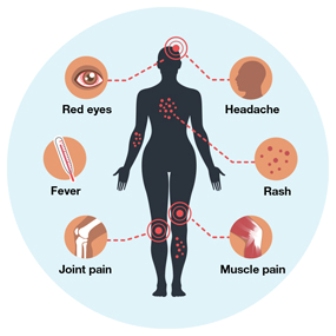New Study Raises Prospect of Zika Virus Therapy
Zika is a major health problem worldwide. It is transmitted by the Aedes mosquito
New drugs could soon be in the offing for Zika virus (ZIKV) infection with a team of scientists at the Institute of Medical Sciences (IMS) in Banaras Hindu University (BHU), Varanasi, getting new insights into how the virus multiplies inside the host.
Institute of Medical Sciences (IMS) in Banaras Hindu University (BHU), Varanasi, getting new insights into how the virus multiplies inside the host.
Zika is a major health problem worldwide. It is transmitted by the Aedes mosquito, the same mosquito that causes dengue, chikungunya, and yellow fever infections. In adults, the symptoms are mild fever, headache, conjunctivitis, joint pain, and body rash. However, in pregnant women, when it is transmitted to the foetus, it may lead to a condition called microcephaly, where the child born would have smaller than normal head size leading to abnormal brain development. The outcomes of microcephaly may differ according to the extent of the brain damage. Besides, there could be certain other congenital malformations too. These are collectively referred to as congenital Zika syndrome.
In 2015, a major outbreak was reported in Brazil, North America, the Pacific, and Southeast Asia, infecting 1.5 million people and with more than 3,500 microcephaly cases reported in infants. Amid the COVID-19 pandemic, 237 cases have been reported from the northern states of India in 2021. Currently, there are no definite antivirals against ZIKV, and only a symptomatic treatment regime is followed. Vaccine or antiviral-drug developments rely on basic scientific research that elucidates the molecular interactions in host cells after infection.
In the new study, a team of researchers led by Prof. Sunit K. Singh, Professor of Molecular Immunology & Virology at the Molecular Biology Unit at BHU’s Institute of Medical Sciences, has found that the virus interacts with a set of cells called microglial cells, which protect the brain from infections and that a protein in the virus called ZIKV-NS1 plays an important role in its replication and immune evasion.
Also Read : COVID-19 Pandemic May Have Been Caused by a “Lab Leak”
The study demonstrated that ZIKV-NS1 compromised the immune response by increasing the expression of a molecule called microRNA-146a in the microglial cells. The increased expression of microRNA-146a targets and reduces the expression of two genes – TRAF6 and STAT1, which leads to reduced production of cytokines and interferons from human microglial cells. This results in the suppression of cellular immune response against the Zika Virus. This suppression of the host’s immune response by ZIKV-NS1 might be a strategy adopted by the Zika virus to promote its multiplication inside the host.
Speaking to India Science Wire, Prof Singh said, “RNA-based drugs and vaccines may play an important role in the prevention of infectious diseases. Our study might have future implications for the development of microRNA-based therapeutics against the Zika virus”.
The study team has published a report in the prestigious science journal “International Journal of Biological Macromolecules”. The team included Astha Shukla, and Meghana Rastogi, besides Prof. Singh. (India Science Wire)
